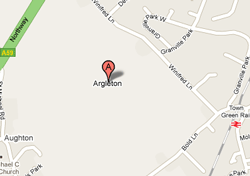Not surprising, there are known errors in Google Maps. Streets are mislabeled, businesses are shown in locations that are incorrect, etc. For example, problems with the map of Toronto can be found here, including the inclusion of two CN Towers standing next to one another in street view.
Rarely are things completely fouled up.
There was an neat little story in London Telegraph over the weekend about Google maps and the town of Argleton, Lancashire, England, postcode L39. Turns out you can find the town on the map, along with views of various homes, job listings and even dating listing.
Trouble is, there is no such town: only an empty field occupies the space.
The listed information is real, but belong to people, businesses, etc. who live in another part of the L39 postcode.
The Telegraph story says, "Google and the company that supplies its mapping data are unable to explain the presence of the phantom town and are investigating."
A spokesperson for the Dutch company Tele Atlas, which provided the information to Google said that, "Mistakes like this are not common, and I really can't explain why these anomalies get into our database."
The Telegraph, however, says that," 'Argle' echoes the word 'Google', while the phantom town’s name is also an anagram of 'Not Real G', and 'Not Large'."
One explanation is that the town was placed there as a "trap" to see who might be copying Google maps and violating its copyrights. Sometimes maps contain "trap streets" just for this purpose.
Another explanation is that is really the future location of England's Area 51 or possibly the "real" location of Hogwarts (apologies to Alnwick).
All other explanations are welcome - let the conspiracy theories begin!
Robert N. Charette is a Contributing Editor to IEEE Spectrum and an acknowledged international authority on information technology and systems risk management. A self-described “risk ecologist,” he is interested in the intersections of business, political, technological, and societal risks. Charette is an award-winning author of multiple books and numerous articles on the subjects of risk management, project and program management, innovation, and entrepreneurship. A Life Senior Member of the IEEE, Charette was a recipient of the IEEE Computer Society’s Golden Core Award in 2008.


